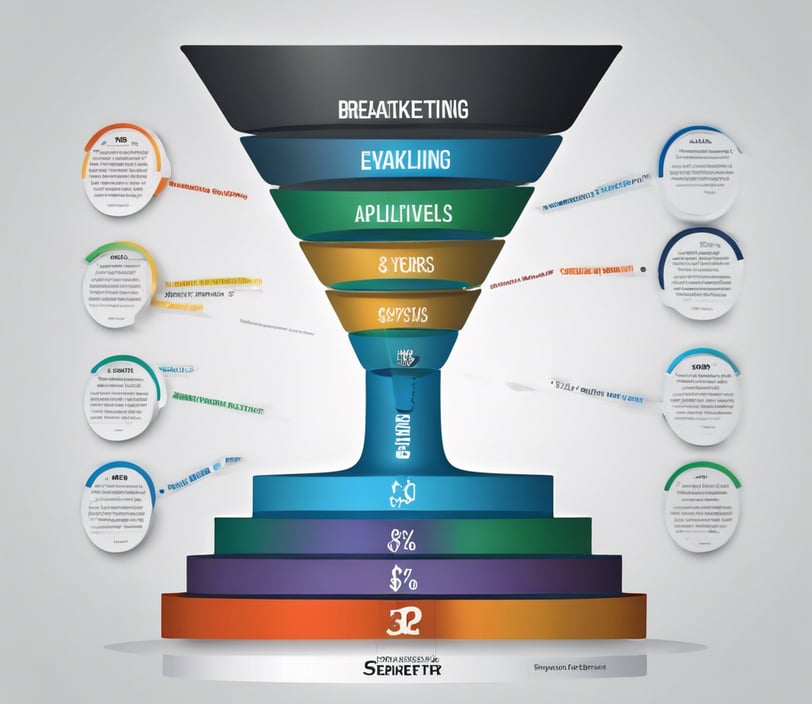
Mastering Sales and Conversion Funnels: A Comprehensive Guide
11/21/20245 min read


Understanding the Basics of Sales Funnels
A sales funnel is a marketing concept that illustrates the journey potential customers go through as they move from initial awareness of a product or service to making a purchase decision. Essentially, it represents the different stages in the customer acquisition process and is designed to help businesses optimize their sales strategies. The funnel typically consists of several key stages: awareness, consideration, and conversion.
At the awareness stage, potential customers first encounter the product or service. This phase is critical as it sets the foundation for the entire sales journey. Various marketing techniques, such as social media advertising, search engine optimization, and content marketing, are used to attract prospects. During this stage, it is essential to create compelling content that draws attention and piques interest.
The next stage, consideration, involves potential customers evaluating their options. Here, individuals begin researching the product or service more thoroughly. Businesses must provide detailed information, such as product features, benefits, and customer testimonials, to aid in the decision-making process. At this point, building trust with prospective buyers is crucial, as it can significantly influence their willingness to proceed to the final stage of the funnel.
In the conversion stage, prospects are ready to commit and make a purchase. This phase requires effective calls to action, tailored offers, and streamlined checkout processes to facilitate the customer's journey toward the final decision. A well-structured sales funnel not only enhances customer experience but also improves sales conversion rates.
To effectively manage and optimize sales funnels, tools such as GetResponse can play a vital role. GetResponse offers automation and analytical features that help businesses track each stage of the funnel, allowing for response adjustments and improvements. By providing insights into customer behavior and funnel performance, GetResponse aids in refining strategies and ultimately driving sales success.
The Importance of Conversion Funnels in Marketing
Conversion funnels are pivotal in shaping marketing strategies that effectively guide potential customers through their buying journey. These funnels outline the steps a customer takes from the initial awareness of a product or service to the final decision to make a purchase. By mapping out this journey, businesses can identify key touchpoints where they can engage with customers and address their needs effectively. This structured approach is essential for nurturing leads, as it allows businesses to tailor their marketing efforts based on the user's stage in the funnel.
Understanding the significance of conversion funnels enables businesses to optimize their marketing campaigns for better performance. A well-defined funnel not only helps in identifying potential customers but also plays a crucial role in enhancing conversion rates. By segmenting leads based on their behaviors and engagement levels, marketers can devise targeted strategies that resonate with each group. For example, nurturing strategies may include personalized email campaigns, engaging landing pages, or informative content that addresses common concerns about the product. These tailored interactions are critical in guiding potential customers towards making a favorable decision.
Additionally, leveraging tools like GetResponse can significantly streamline the management of conversion funnels. GetResponse offers features such as landing page creation, email marketing automation, and analytics, which can enhance the entire funnel experience. With these tools, marketers can effortlessly track and optimize conversions at every stage of the funnel. Implementing such technological solutions leads to more refined targeting and engagement strategies, ultimately resulting in increased sales and customer satisfaction. Focusing on conversion funnels clarifies the pathway toward successful conversions and aligns marketing efforts with business objectives, fostering overall growth.
Best Practices for Creating Effective Sales Funnels
Designing effective sales funnels is integral to converting prospects into customers and optimizing revenue generation. To achieve this, it is vital to start with audience segmentation. Identifying distinct segments within your target market allows for tailored messages that resonate deeply with each group. By refining your audience, you ensure that your content speaks directly to their specific pain points and interests, increasing engagement and strengthening relationships.
Engaging content creation is another essential aspect of a successful sales funnel. High-quality, relevant content should align with each stage of the funnel, guiding potential customers from awareness to decision-making. This may involve creating compelling blog posts, informative videos, or engaging social media content that not only informs but also inspires action. Utilizing storytelling techniques can be particularly effective, as they create an emotional connection that encourages prospects to proceed through the funnel.
Data analytics serve as a cornerstone for refining sales funnels. Regularly reviewing key performance indicators (KPIs) such as conversion rates, drop-off points, and user engagement metrics enables businesses to identify areas needing improvement. A/B testing various elements of the funnel—like landing page designs or call-to-action buttons—provides insights into what resonates best with your audience. By continuously iterating based on data, you can optimize the effectiveness of your sales funnels.
Utilizing platforms like GetResponse can significantly enhance the implementation of these best practices. GetResponse offers a suite of tools tailored for building and optimizing sales funnels, including customizable landing pages, automated workflows, and detailed analytics dashboards. These features empower businesses to create more effective sales funnels by streamlining processes and allowing for easy adjustments based on real-time data. Consequently, your marketing efforts can transition from mere strategy to tangible results efficiently.
Measuring Success: Analytics and Adjustments
To ensure the effectiveness of sales and conversion funnels, businesses must employ analytics as a crucial tool for monitoring performance and facilitating improvements. The use of data analytics enables organizations to gain insights into customer behavior, identify bottlenecks, and enhance the overall performance of their sales funnels. By establishing clear key performance indicators (KPIs), businesses can systematically evaluate the effectiveness of each stage in their sales process.
Some essential KPIs to consider include conversion rates, average order value, customer acquisition cost, and dropout rates at various funnel stages. For instance, monitoring conversion rates provides a direct measure of how effectively leads are converting into paying customers. Similarly, tracking average order value can help identify upsell opportunities and assess the effectiveness of pricing strategies. Understanding customer acquisition costs allows businesses to determine the value of their marketing efforts, ensuring that resources are allocated efficiently.
Continuous improvement in sales funnels relies on the ongoing analysis of these KPIs. With this data, businesses can make informed adjustments to their strategies, thereby optimizing the customer journey and maximizing revenue. It is crucial to approach this process iteratively; testing new strategies, evaluating their impact, and then adjusting based on the resulting data ensures that the funnel remains agile in response to changing market dynamics and customer preferences.
Furthermore, platforms like GetResponse offer comprehensive analytics tools designed to simplify the process of funnel performance evaluation. These tools provide users with actionable insights into their data, enabling them to pinpoint areas for improvement. By leveraging robust analytics capabilities, businesses can ensure their sales funnels are not only effective but continually refined to meet customer expectations and drive sales growth.




